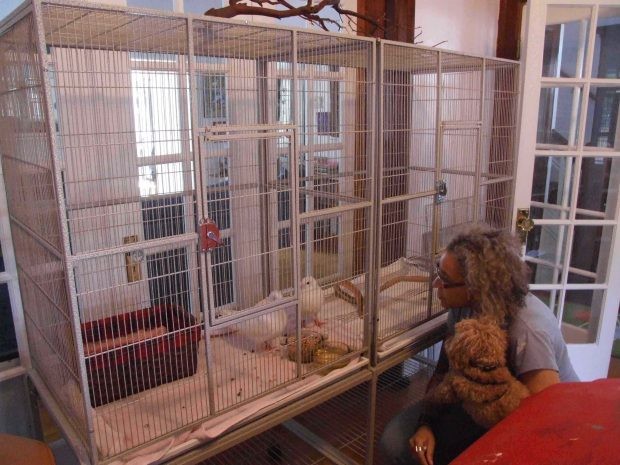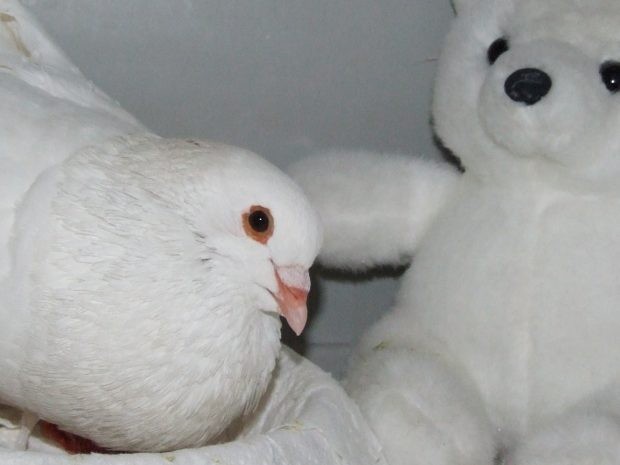Are you curious about pigeon keeping and asking, “Can You Keep A Pigeon As A Pet?” Absolutely! Pigeons, often misunderstood, can make wonderful companions, offering unique joys and requiring specific care. This comprehensive guide, brought to you by PETS.EDU.VN, will explore everything you need to know about keeping pigeons as pets, from housing and feeding to health and companionship, helping you decide if these gentle birds are the right fit for your lifestyle. We will cover everything from pigeon care to creating the perfect pigeon loft and more.
1. Are Pigeons Good Pets? Unveiling the Truth
Pigeons are indeed good pets for the right person. They are intelligent, gentle, and relatively easy to care for, making them suitable companions. According to a study by the University of California, Davis, pigeons exhibit remarkable cognitive abilities, including recognizing individual human faces and navigating complex environments, indicating their potential for interaction and bonding. Pigeons bring a unique blend of low-maintenance care and high-reward companionship to the world of pet ownership.
- Intelligent and Trainable: Pigeons are smarter than many people realize. They can be trained to perform simple tasks, making them engaging pets.
- Gentle Nature: Known for their docile temperament, pigeons rarely bite or scratch, making them safe around children.
- Low Maintenance: Compared to other birds, pigeons are relatively low maintenance, requiring basic care and a clean environment.
2. What Type of Pigeon Can Be Kept as Pets?
Choosing the right pigeon breed is crucial for a fulfilling pet-owner relationship. Several breeds are well-suited for domestication, each with unique characteristics. The American Dove Association recognizes a variety of pigeon breeds, each with distinct temperaments and care requirements. It’s essential to select a breed that aligns with your lifestyle and experience level.
Here’s a detailed look at some popular breeds for pigeon keeping:
| Breed | Temperament | Size | Special Needs |
|---|---|---|---|
| King Pigeon | Calm, gentle, and easy to handle | Large | Prone to obesity; needs a balanced diet |
| Fantail Pigeon | Friendly and ornamental | Medium | Requires regular grooming to maintain feather health |
| Homer Pigeon | Intelligent and active | Medium | Needs space for flying and exercise |
| Tumbler Pigeon | Playful and acrobatic | Small | Benefits from mental stimulation and toys |
| Roller Pigeon | Active and social | Small | Thrives in a flock environment |
| Modena Pigeon | Docile and ornamental | Large | Needs a spacious coop to accommodate its size |
| Archangel Pigeon | Graceful and unique in appearance | Medium | Benefits from a varied diet |
| Frillback Pigeon | Striking appearance with curled feathers | Medium | Requires regular grooming to prevent feather damage |
| Jacobin Pigeon | Distinctive feathered hood around the head | Medium | Needs protection from extreme weather conditions |
| Trumpeter Pigeon | Known for its unique vocalizations | Medium | Requires attention and interaction to thrive |
| Norwich Cropper Pigeon | Unique inflatable crop | Large | Needs careful diet management to prevent crop issues |
| Old Dutch Capuchine Pigeon | Distinctive feathered hood and frill on the chest | Medium | Benefits from a clean and dry environment |



3. How to Prepare to Keep a Pigeon as a Pet?
3.1. Secure a Legal Permit
Before bringing a pigeon home, research and comply with local regulations. Bird ownership laws vary by region, and some areas may require permits or prohibit keeping pigeons. The U.S. Fish and Wildlife Service provides resources for understanding federal and state regulations regarding bird ownership. Make sure you’re following all the rules.
3.2. Understand Pigeon Behavior
Pigeons are social creatures with complex behaviors. Learning about their habits and communication methods will enhance your bond and help you provide appropriate care. A study published in Animal Cognition highlights the social intelligence of pigeons, demonstrating their ability to learn from and adapt to their environment.
3.3. Health Check at the Vet
Prioritize your pigeon’s health by scheduling a check-up with an avian veterinarian. A vet can identify potential health issues and provide guidance on preventive care. The Association of Avian Veterinarians offers a directory of qualified vets specializing in bird health.
3.4. Find a Reputable Breeder
Acquire your pigeon from a reputable breeder or rescue organization. Responsible breeders prioritize the health and temperament of their birds. The National Pigeon Association provides resources for finding reputable breeders and learning about different breeds.
3.5. Proper Housing
Creating a safe and comfortable living space is essential for your pigeon’s well-being. Whether you choose an indoor cage or an outdoor aviary, ensure it meets their needs. According to the Royal Pigeon Racing Association, the minimum space requirement for a pair of pigeons is 6 feet long x 4 feet deep x 6 feet high.
3.6. Provide Enrichment
Pigeons need mental and physical stimulation to thrive. Provide toys, perches, and opportunities for exploration to keep them engaged. A study in the journal Applied Animal Behaviour Science emphasizes the importance of environmental enrichment for captive birds.
4. What Do Pet Pigeons Need for Their Aviary or Pigeon Loft?
Creating a comfortable and stimulating environment for your pet pigeon is crucial for their well-being, whether indoors or outdoors.
4.1. Outdoor Aviary Essentials
An outdoor aviary provides pigeons with fresh air, sunlight, and space to fly. Here’s what you need to create the perfect outdoor aviary:
- Size and Structure: A minimum of 6 feet long x 4 feet deep x 6 feet high for four birds, built with sturdy, predator-proof materials.
- Secure Mesh: 16-gauge hardware mesh with openings of half an inch or smaller to keep out rodents and predators.
- Sheltered Corner: A shaded and dry area to protect pigeons from harsh weather conditions.
- Perches: Multiple perches at varying heights for roosting and resting.
- Dust Bathing Area: A shallow container filled with sand or dirt for pigeons to preen and clean their feathers.
- Food and Water Stations: Elevated and easy-to-clean containers for food and water.
4.2. Indoor Cage Essentials
An indoor cage offers a safe and controlled environment for pet pigeons. Here’s what you need to set up an indoor cage:
- Cage Size: A double-flight cage or extra-large dog kennel is suitable for a pair of pigeons.
- Solid Bottom: Easy-to-clean flooring to manage droppings.
- Perches: Multiple perches at varying heights for roosting and resting.
- Food and Water Dishes: Easy-to-access and clean containers for food and water.
- Toys and Enrichment: Ladders, swings, and mirrors to keep pigeons entertained.
- Pigeon Pants: Harnesses with diapers to catch droppings for free-roaming pigeons.
5. How to Feed Your Pet Pigeon?
Proper nutrition is essential for maintaining the health and vitality of pet pigeons. Understanding their dietary needs and providing a balanced diet is crucial. According to a study published in the Journal of Animal Physiology and Animal Nutrition, a well-balanced diet significantly impacts the overall health and reproductive success of pigeons.
5.1. Balanced Diet for Pigeons
Pigeons require a varied diet consisting of grains, seeds, and occasional treats. A typical pigeon diet should include:
- Mixed Grains: A blend of corn, wheat, barley, and oats.
- Seeds: Sunflower seeds, safflower seeds, and millet for added nutrition.
- Legumes: Peas, lentils, and beans for protein.
- Grit: Insoluble grit to aid digestion.
5.2. What Foods Are Dangerous for Pigeons
Some foods are toxic to pigeons and should be avoided:
- Chocolate: Contains theobromine, which is toxic to birds.
- Avocado: Contains persin, which can cause heart problems.
- Onions and Garlic: Can cause anemia in birds.
- Salty Snacks: High sodium levels can lead to dehydration and kidney damage.
5.3. How Much Should You Feed Your Pet Pigeon?
The amount of food a pigeon needs depends on its size, age, and activity level. A general guideline is to provide about 1-1.5 ounces of food per day. Observe your pigeon’s weight and adjust the amount accordingly.
5.4. Feeding Schedule for Pigeons
Establish a consistent feeding schedule for your pigeons. Feed them once or twice a day, providing fresh food and water each time. Remove any uneaten food to prevent spoilage.
5.5. Best Food Choices
Choose high-quality pigeon feed from a reputable supplier. Look for a balanced mix of grains and seeds, supplemented with essential vitamins and minerals. Consult with an avian veterinarian for specific dietary recommendations.
6. How to Take Care of a Pet Pigeon?
Proper care is essential for keeping your pet pigeon healthy and happy. Understanding their specific needs and providing consistent care is key to their well-being.
6.1. How to Clean Your Pet Pigeons
Maintaining cleanliness is crucial for preventing disease and promoting hygiene in pet pigeons.
- Cage Cleaning: Clean the cage daily by removing droppings and debris.
- Water Hygiene: Change the water daily and clean the water container to prevent bacterial growth.
- Bathing: Provide a shallow dish of water for bathing. Pigeons enjoy bathing and preening their feathers.
- Grooming: Regularly check for parasites or feather damage and address any issues promptly.
6.2. How to Train Your Pet Pigeons
Pigeons are intelligent and can be trained to perform simple tasks. Use positive reinforcement techniques, such as treats and praise, to encourage desired behaviors.
- Basic Commands: Teach your pigeon to come when called or to perch on your hand.
- Potty Training: Pigeons can be trained to relieve themselves in a designated area.
- Enrichment Activities: Provide toys and puzzles to keep them mentally stimulated.
6.3. Health Care for Pet Pigeons
Regular veterinary check-ups are essential for maintaining your pigeon’s health. Vaccinate against common diseases and monitor for signs of illness.
- Vaccinations: Consult with an avian veterinarian about necessary vaccinations.
- Parasite Control: Regularly check for mites, lice, and worms.
- Common Diseases: Be aware of common pigeon diseases such as pigeon pox, coccidiosis, and respiratory infections.
6.4. Bonding with Your Pet Pigeon
Building a strong bond with your pigeon requires time, patience, and positive interactions.
- Spending Time: Spend time with your pigeon daily, talking to them and offering treats.
- Hand Feeding: Hand feeding can help build trust and strengthen the bond.
- Positive Reinforcement: Use praise and rewards to encourage positive behaviors.
7. Common Health Problems of Pet Pigeons
Understanding the common health issues that can affect pigeons is crucial for providing timely and effective care. Regular monitoring and preventive measures can help keep your feathered friend healthy.
7.1. Pigeon Pox
Pigeon Pox is a viral disease that causes lesions on the skin and mucous membranes of pigeons. According to research from the University of Georgia’s Poultry Diagnostic and Research Center, the disease is transmitted through mosquito bites and direct contact with infected birds. Symptoms include:
- Skin lesions or scabs
- Difficulty eating or breathing
7.2. Coccidiosis
Coccidiosis is a parasitic infection that affects the intestines of pigeons, leading to poor nutrient absorption and general weakness. According to a study published in the Veterinary Parasitology journal, the disease is particularly prevalent in young pigeons and those kept in unsanitary conditions. Symptoms include:
- Diarrhea
- Weight loss
- Lethargy
7.3. Respiratory Infections
Respiratory infections, such as Mycoplasma and Ornithosis, are common in pigeons and can cause significant respiratory distress. According to the American Association of Avian Veterinarians, these infections are often exacerbated by poor ventilation and stress. Symptoms include:
- Coughing
- Sneezing
- Nasal discharge
7.4. Parasitic Infestations
Pigeons can be infested with external parasites like mites and lice, as well as internal parasites like worms. According to the National Pigeon Association, regular deworming and mite control are essential for maintaining pigeon health. Symptoms include:
- Feather plucking
- Restlessness
- Weight loss
7.5. Newcastle Disease
Newcastle Disease is a highly contagious viral disease that can cause severe neurological and respiratory symptoms in pigeons. According to the World Organisation for Animal Health, the disease can have devastating effects on pigeon populations. Symptoms include:
- Twisted neck
- Paralysis
- Respiratory distress
8. The Joys of Pigeon Companionship
Pigeons offer unique companionship, providing owners with affection, entertainment, and a sense of fulfillment.
8.1. Emotional Support
Pigeons are known for their calming presence and can provide emotional support to their owners.
8.2. Entertainment
Watching pigeons engage in their natural behaviors, such as preening, cooing, and flying, can be highly entertaining.
8.3. Sense of Purpose
Caring for pigeons provides a sense of purpose and responsibility, enhancing the owner’s well-being.
9. Ethical Considerations of Pigeon Keeping
Keeping pigeons as pets comes with ethical responsibilities. Ensure that you can provide a suitable environment, proper care, and a fulfilling life for your pigeons.
9.1. Providing Adequate Care
Commit to providing proper housing, nutrition, and veterinary care for your pigeons.
9.2. Preventing Overpopulation
Control breeding to prevent overpopulation and ensure that all pigeons have access to suitable homes.
9.3. Respecting Their Natural Behaviors
Allow pigeons to express their natural behaviors, such as flying, foraging, and socializing.
10. FAQs About Keeping Pigeons as Pets
10.1. Are pigeons noisy pets?
Pigeons are relatively quiet pets, but they do coo and make soft vocalizations. Their noise level is generally lower than that of many other bird species, making them suitable for apartment living.
10.2. Do pigeons need a lot of space?
Pigeons need adequate space to fly and exercise. An outdoor aviary or a large indoor cage is necessary for their well-being.
10.3. Can pigeons be left alone?
Pigeons are social creatures and thrive on interaction. They should not be left alone for extended periods. Providing a companion pigeon or spending quality time with them is essential.
10.4. How long do pigeons live?
Pigeons can live for 15-20 years with proper care.
10.5. Do pigeons carry diseases?
Pigeons can carry diseases, but the risk is minimal with proper hygiene and regular veterinary care.
10.6. Are pigeons intelligent?
Pigeons are highly intelligent and can be trained to perform simple tasks.
10.7. Can pigeons be potty trained?
Yes, pigeons can be potty trained to relieve themselves in a designated area.
10.8. Do pigeons need baths?
Yes, pigeons enjoy bathing and need access to water for preening and cleaning their feathers.
10.9. What is the best breed of pigeon to keep as a pet?
King Pigeons and Fantail Pigeons are popular choices for pets due to their gentle nature and ease of care.
10.10. How much does it cost to keep pigeons as pets?
The cost of keeping pigeons as pets varies depending on housing, food, and veterinary care. Initial setup costs can range from $500-$1000, with ongoing expenses of $50-$100 per month.
Keeping a pigeon as a pet can be a deeply rewarding experience, offering unique companionship and a sense of connection to nature. Whether you choose to house your pigeons indoors or outdoors, providing them with proper care, enrichment, and attention is key to their well-being.
Ready to explore the world of pigeon keeping further? Visit PETS.EDU.VN for more in-depth guides, expert advice, and a supportive community of pet lovers. Discover the joys and rewards of pigeon ownership and create a fulfilling life for your feathered friends.
For further assistance, contact us:
- Address: 789 Paw Lane, Petville, CA 91234, United States
- WhatsApp: +1 555-987-6543
- Website: PETS.EDU.VN
Let pets.edu.vn be your trusted resource for all things pet-related. Join us today and embark on a journey of discovery and connection with the animal kingdom.
